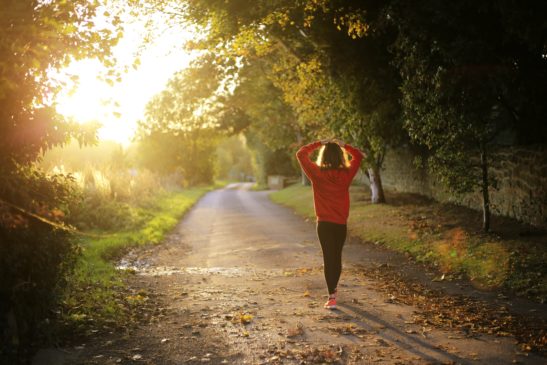
There is a freedom that comes with awareness.
Life is a journey of many steps taking us down a winding road of constant evolution. And each day, we are provided with a myriad of opportunities that can allow us to transform into our successive best selves – the beginning states of wellness.
One moment we have an opportunity to react differently when yet another someone in our life rubs us the wrong way; on another day, we may find ourselves wanting to walk away from a particular circumstance but are unsure if we can.
We may find ourselves stuck in a rut that we can never seem to get out of as we travel along. We may even make the same choices repeatedly because we don’t know how to choose otherwise. Lots of people get stuck in their career choices. Their job doesn’t bring them any satisfaction or seems without purpose. In an ethereal sense, we become stuck.
Rather than moving us forward, our paths may take us in a seemingly never-ending circle where our actions and choices lead us nowhere but to where we’ve already been. During these moments, awareness can be the first step to change.
Many times our decisions lead to painful circumstances prompting us to make a change. Sadly, I’ve witnessed many people using negative coping skills at this life-changing point because they are not aware enough to know they’re at a learning point. However, the Universe is trying to wake them to become aware of their choices. But unfortunately, they choose to escape the pain and miss the opportunity.
Albert Einstein told us, “The level of consciousness which created the problem cannot solve the problem.”
Therefore, we need to ask for help or raise our level of consciousness.
What is Awareness
Awareness is when we awake to the realization of our thoughts and actions. We observe ourselves, noticing our reactions, activities, and choices as if we were detached viewers. I like to say we become the watcher. Awareness is the first step to change because we can’t change unless we know we need to. This is why awareness is the first step toward wellness. We become consciously aware that our decision-making contributes to our wellness or makes us unwell.
We can then begin understanding why we are doing what we are doing. Afterward, it becomes difficult not to change because we are no longer asleep to the truth behind our behaviors that negatively impact our wellness. We also begin to realize that, just as much as we are the root source behind the causes of our behaviors, we are also the originator of any changes that we want to happen in this world. Thus, we become co-creators of our reality.
Becoming Aware is Liberating
There is freedom that comes with awareness. Rather than being stuck in a repetitive cycle where there is no escape, we begin to see that we very much play a hand in creating our lives. Whether we are aware of them or not, our behaviors and choices are always ours to make. However, our past and present no longer dictate our future when we choose to be aware.
We can move beyond our old limits, make new choices, and take further actions. With awareness, our paths cannot help but wind us forward in our lives while paving the way for new experiences and ways of being. It is through understanding that we can continue to evolve consciously.
It is an awareness that opens up a new life centered on wholeness and wellness. As we begin to make better choices for ourselves and our relationships, we begin to feel better. Instead of beating ourselves up with our negative self-talk, we can start to build our self-esteem with positive affirmations. We change from believing there must be a better way to knowing.
Benefits of Self-Awareness
Now, let’s shift our attention to the outcomes of being self-aware. As you might imagine, there are many benefits to practicing self-awareness:
- It can make us more proactive, boost our acceptance, and encourage positive self-development.
- Self-awareness allows us to see things from the perspective of others, practice self-control, work creatively and productively, and experience pride in ourselves and our work, as well as general self-esteem.
- It leads to better decision-making, especially regarding our wellness.
- It can make us better at our jobs, better communicators in the workplace, and enhance our self-confidence and job-related well-being.
These benefits are reason enough to improve self-awareness, but this list is by no means exhaustive. Self-awareness can enhance virtually every experience you have, as it’s a tool and a practice that can be used anywhere, anytime, to ground yourself at the moment, realistically evaluate yourself and the situation and help you make good choices. As the watcher, your observing skills improve, which means self-improvement. You are developing your higher self. As you raise your consciousness, you become more connected to the Universe and nature surrounding you.
Ways to Nurture Self Awareness
Now that we have awakened to this new way of being, how do we develop our self-awareness? We’ll start with fundamental ways to get started, which you can practice incorporating. The keyword here is practice. Explore what works for you. The practice of self-awareness is just that: a practice. Learning how to be self-aware is a life-long journey, and it’s never too late to start. Here are four recommended practices:
Write in a journal
Journaling is an excellent way to increase self-awareness; it’s the perfect method for exploring the other strategies on this list. For example, when you write down negative emotions, you can reexamine scenarios and identify common triggers. Journaling can also help you challenge your thoughts, as it’s easier to catch yourself saying untrue statements on paper (versus thinking them at the moment). Moreover, as you reread your journal, you’ll be able to see just how much you’ve grown. Finally, as you journal, it will test how honest you are with yourself.
Remember, there’s no right or wrong way to journal. Don’t hesitate to experiment with different journaling methods to cultivate self-awareness. Examples include writing one line daily for a set amount of time or in a guided journal with built-in prompts. Thus, the concept of wellness becomes habitual or routine.
Question your opinions and beliefs
Challenging your opinions and beliefs is a fantastic way to learn about your new self. It increases your awareness of your thoughts, biases, and behaviors stemming from those thoughts and judgments. It’s about recognizing whether your opinions and beliefs are yours or ones you’ve carried forward from others. Do they mean anything to you or just words you’ve heard others say?
If you’re unsure where to start, ask yourself questions like: “What is the origin of this opinion? Is this opinion beneficial to the people I love or to me? Is there any truth to my viewpoint?” Asking these questions will allow you to identify and assess your thought patterns.
Identify your triggers
Understanding what makes you mad, sad, stressed, or jealous can go a long way in self-awareness. The reason? When you recognize what sparks your negative emotions, you can become more selective of the people, places, and situations you choose to engage in. It also helps you become more conscious of responding to your environment and things you can’t control.
To learn more about your triggers, examine any situation, person, or thing that prompts a negative emotion. For example, you can ask yourself, “What did the other person say caused me to feel this way? What was my reaction? Is this something I want to feel regularly?” You can then use your responses to make informed decisions that facilitate a more peaceful life. Write it down in your journal, and feel free to use the internet. Learning to spot negative emotions goes a long way to improving your wellness.
Seek out new experiences
One of the best ways to boost self-awareness is to immerse yourself in new experiences. This lets you step outside of your comfort zone, giving you a chance to learn how you act, think, and feel in unfamiliar situations. Moreover, it creates opportunities to discover both your fears and positive qualities.
After all, your comfort zone is a tight space, a state of mind where you exist on autopilot, complete with predictable thoughts and emotions. This limits your perspective to just part of who you are rather than you as a whole person.
Fortunately, a new experience doesn’t need to be complex or expensive. It can be as simple as trying a new hobby, chatting with new people, or exploring a neighboring town. Maybe you’ve always wanted to try a new restaurant or go out with a new friend but always found an excuse not to. Whatever you choose to do, these experiences will help you gain a different perspective.
Mindfulness Meditation
Meditation is exploring. It’s not a fixed destination. Your head doesn’t become vacuumed free of thought, utterly undistracted. Instead, it’s a special place where each moment is meaningful. When we meditate, we venture into the workings of our minds and expand the role of the watcher: our senses, emotions, and wandering thoughts.
The watcher in mindfulness meditation is not judgmental. On the contrary, it unleashes our natural curiosity about the workings of the mind, approaching our experience with compassion for ourselves and others.
Mindfulness is available to us in every moment, whether through meditation and body scans or mindful moment practices like pausing and breathing before we launch an email or answer the phone.




